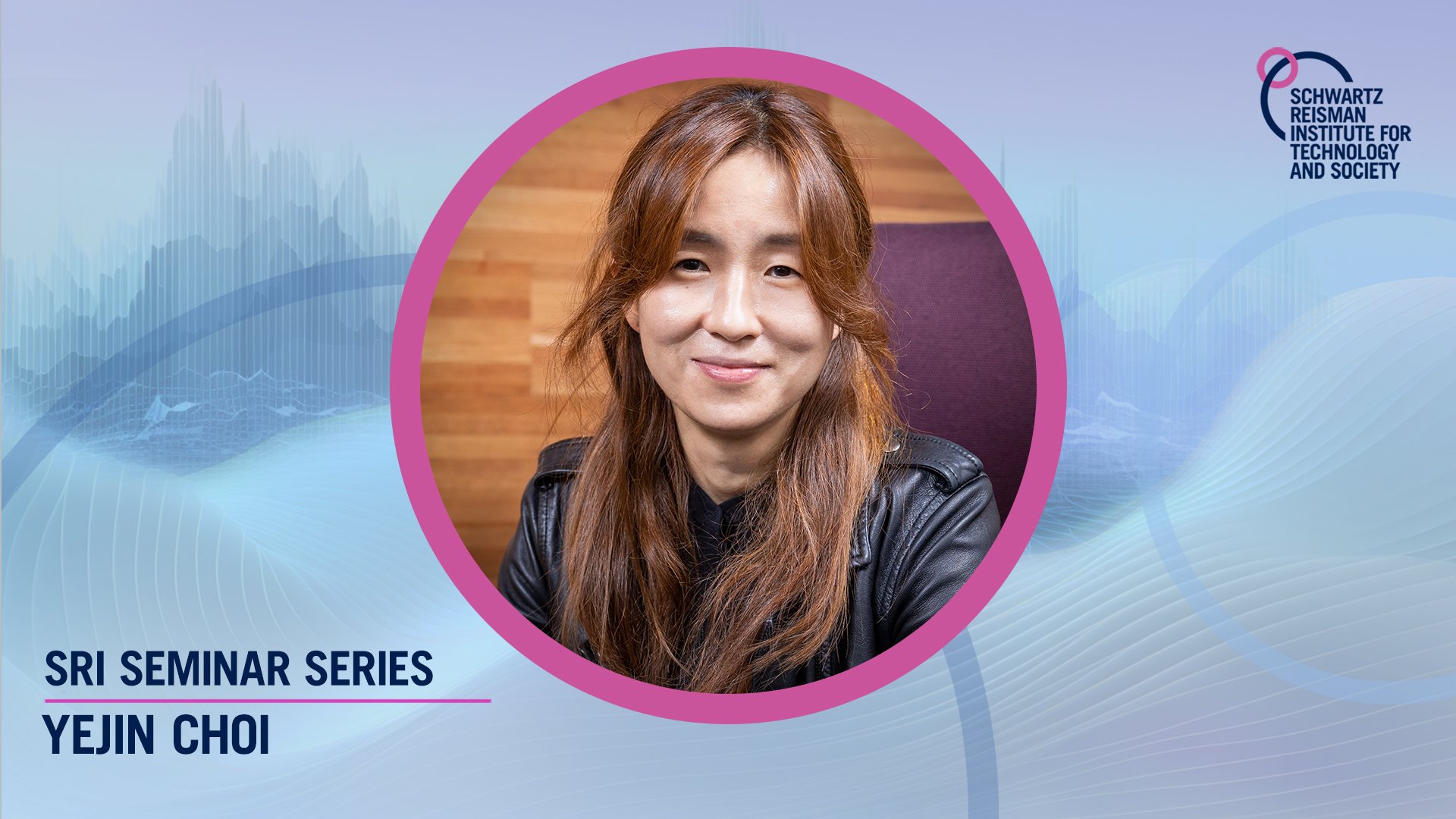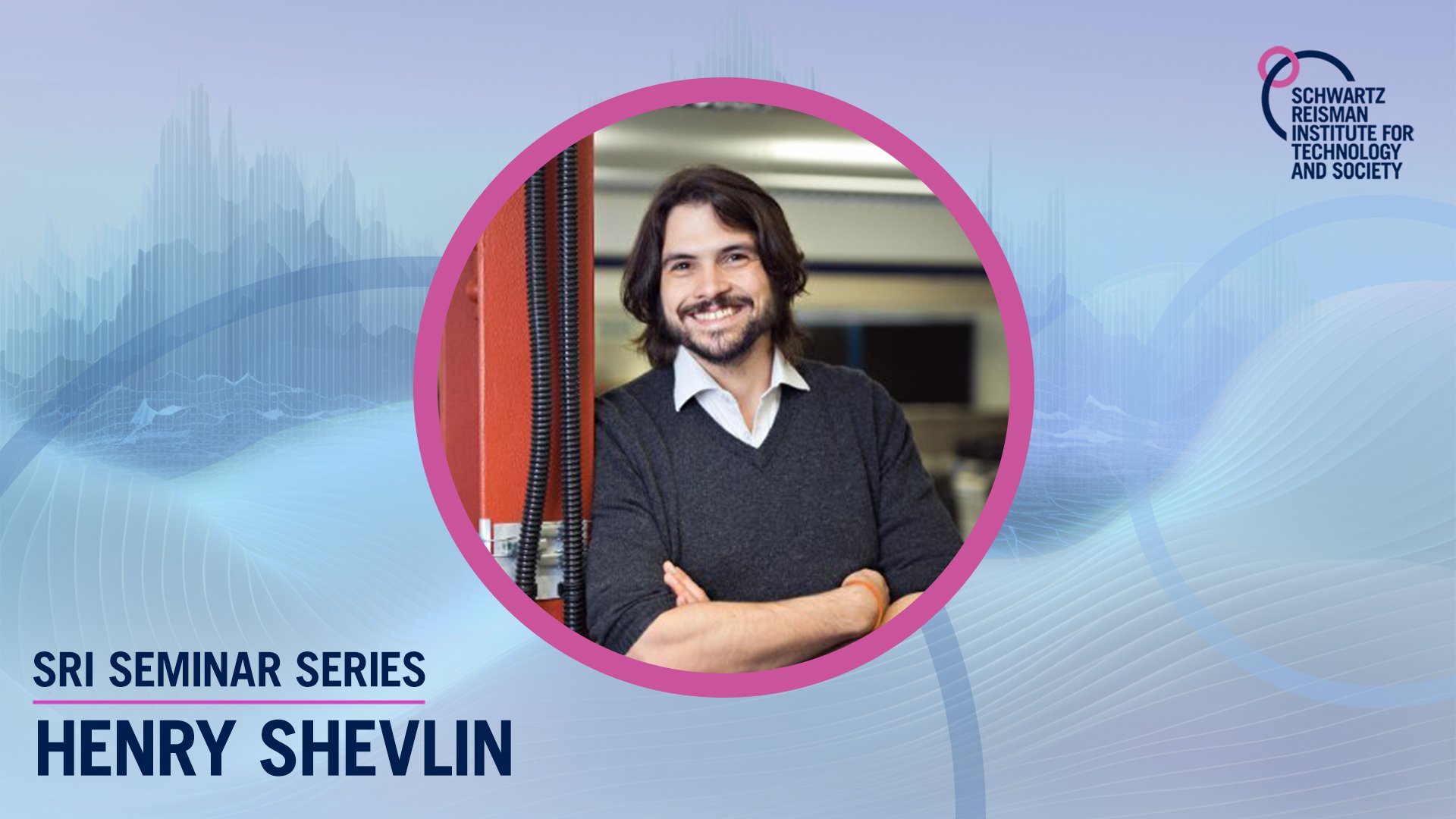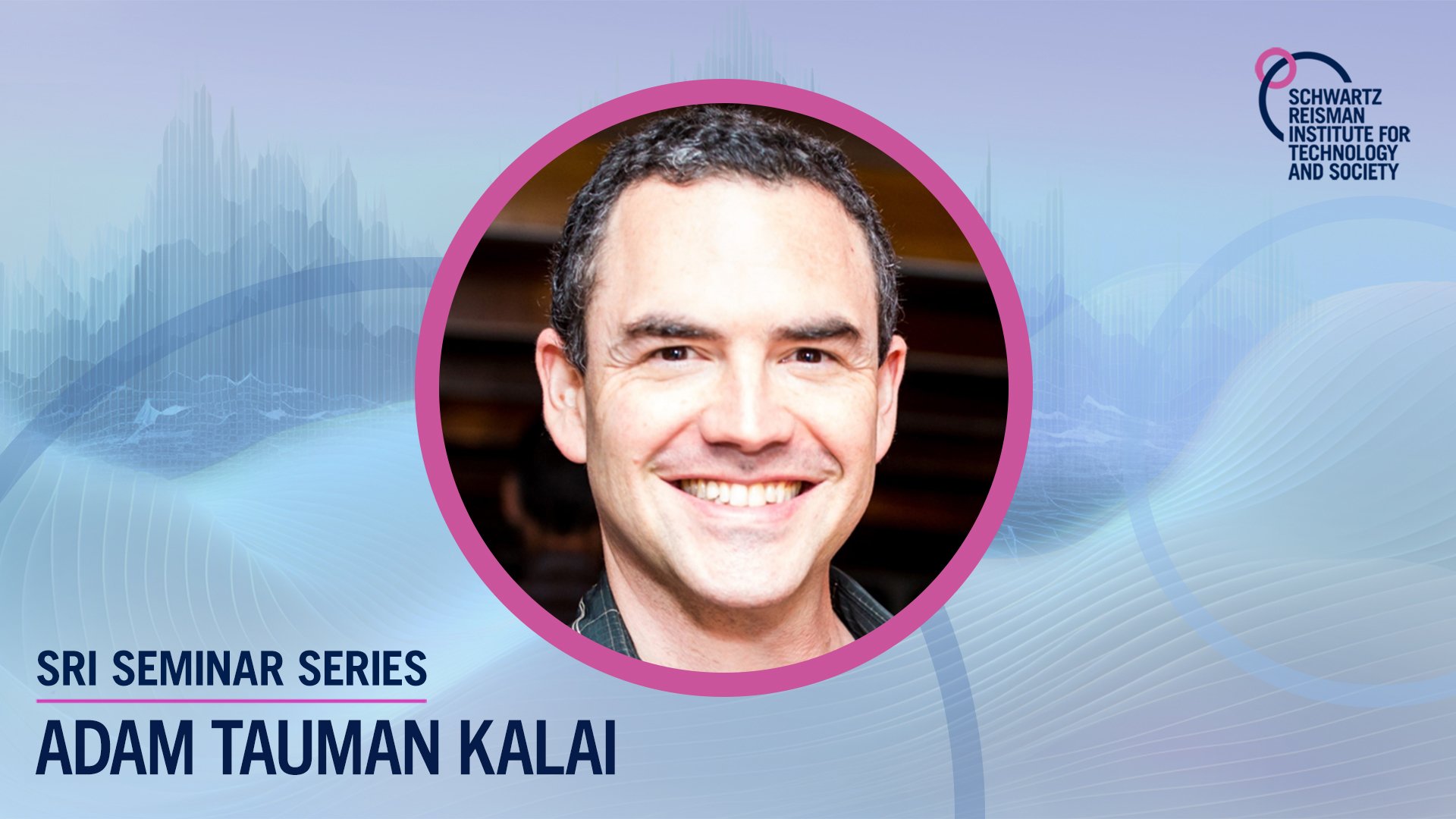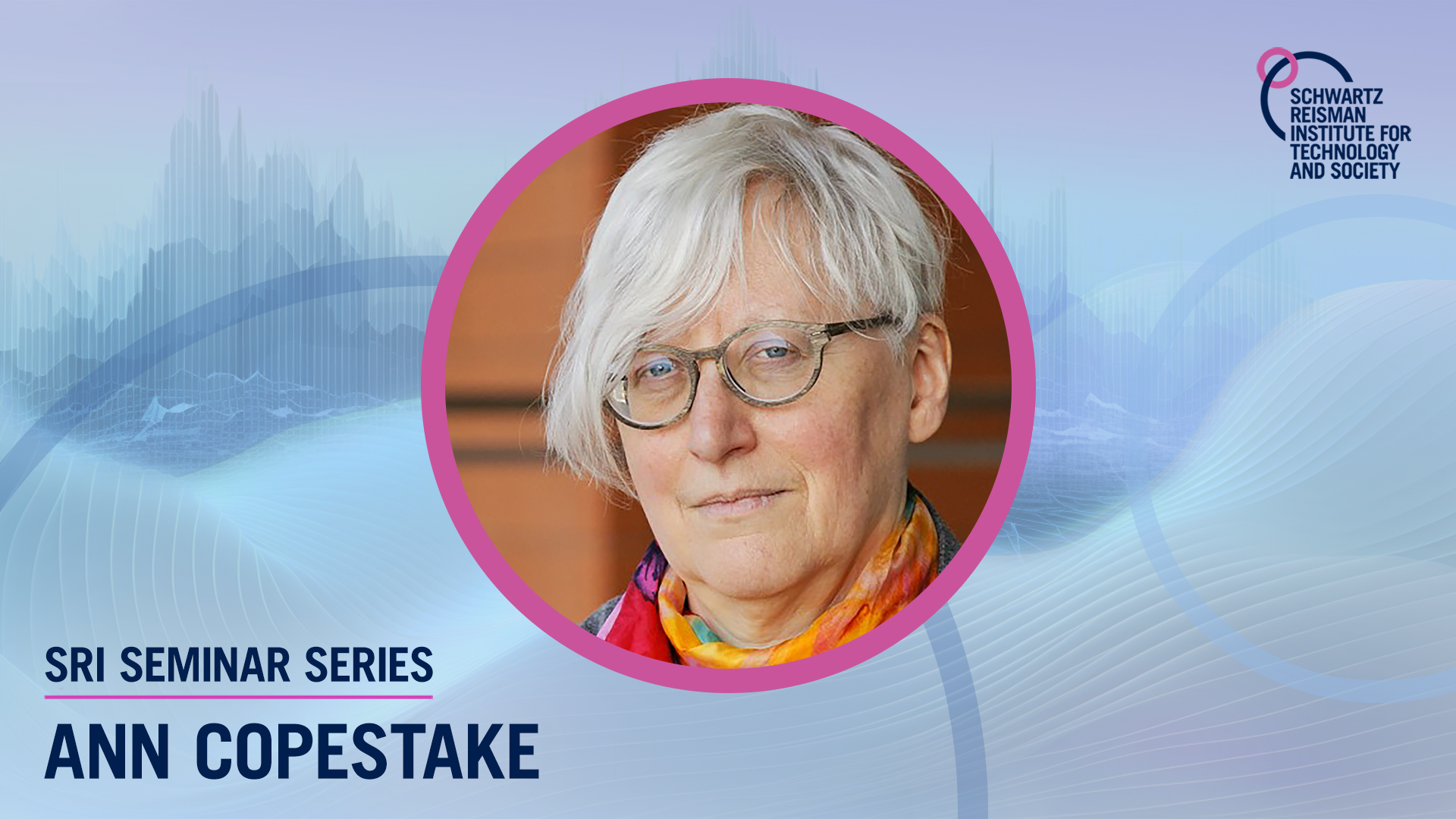
SRI Seminar Series: Sandra Wachter, “Do large language models have a legal duty to tell the truth?”
What is the legal and societal cost of “careless speech” in large language models? Join Sandra Wachter, professor of technology and regulation at the University of Oxford, for an exploration of how AI mistruths threaten knowledge systems and social trust, and how legal frameworks can address these emerging risks.

SRI Seminar Series: Joshua August Skorburg, “Decisions, decisions, decisions: A value-based account of the attention economy”
What really drives our attention in the digital age—addiction and compulsion, or our own representations of value? Join the University of Guelph’s Joshua August Skorburg for a talk exploring a new way of understanding the attention economy, showing how digital distractions influence our choices and sense of control.

SRI Seminar Series: Beth Coleman, “Building trust in AI: A multi-disciplinary approach to a key paradigm”
Join SRI Research Lead Beth Coleman for a talk exploring the pivotal role of trust in human interactions with machine learning and AI technologies.

SRI Seminar Series: Yejin Choi,“The enigma of LLMs: On creativity, pluralism, and paradoxes”
Join Yejin Choi, incoming professor in the Department of Computer Science at Stanford University, for an engaging presentation on the design of commonsense and moral reasoning in AI systems.

SRI Seminar Series: Catherine Stinson, “Artificial intelligence benchmarks and degenerating research”
Join Catherine Stinson, Queen’s National Scholar in the Philosophical Implications of AI, for a special in-person seminar on the role of benchmark datasets in AI research, co-presented by the Institute for the History and Philosophy of Science and Technology.

SRI Seminar Series: Pamela Samuelson, “Will copyright derail generative AI technologies?”
Join Pamela Samuelson, distinguished professor of law at UC Berkeley and co-director of the Berkeley Center for Law & Technology, for a talk on the copyright challenges and legal implications posed by generative AI technologies.

SRI Seminar Series: Rahul G. Krishnan, “From associational to causal predictions with deep learning”
How is machine learning transforming healthcare? Join Rahul G. Krishnan, University of Toronto professor and Canada Research Chair in Computational Medicine, to discover how AI innovations are revolutionizing diagnostics, treatment, and personalized care.

SRI Seminar Series: Virginia Dignum, “Beyond the AI hype: Balancing innovation and social responsibility”
How can we build AI systems that reflect human values and promote social good? Join Virginia Dignum, professor of computer science at Umeå University, for a discussion on the ethical design and governance of artificial intelligence technologies.

SRI Seminar Series: Christopher Summerfield, “The Habermas Machine: Using AI to help people find common ground”
Can AI systems act as an mediator to help groups with differing views find consensus? Join Christopher Summerfield, professor of cognitive neuroscience at the University of Oxford, to explore how AI systems shed light on human decision-making.

SRI Seminar Series: Daniel E. Ho, “Large legal fictions: Assessing the reliability of AI in legal research”
What emerging risk frameworks and policy considerations for the use of advanced technologies like AI in high-stakes contexts are on the horizon? Join Stanford’s Daniel E. Ho to learn about assessing the reliability of AI in legal research.

SRI Seminar Series: Henry Shevlin, “All too human? Identifying and mitigating ethical risks of Social AI”
What ethical risks might occur when AI systems are used for human social needs like romance, companionship, or entertainment? Join the University of Cambridge’s Henry Shevlin for an exploration of the potential benefits and harms of social AI.

SRI Seminar Series: Aziz Huq, “The geopolitics of digital regulation”
How is the regulation of digital technologies influenced by geopolitical competition? Join the University of Chicago’s Aziz Huq for a talk on the future of the governance of technology.

SRI Seminar Series: Rediet Abebe, “When does resource allocation require prediction?”
How can algorithms contribute to or reduce inequality? Join Rediet Abebe to explore how mathematics and computation can support more equitable outcomes in the public sphere.

SRI Seminar Series: Laura Rosella, “From development to deployment: Can we improve the health of populations with AI?”
How can AI systems better support public health planning and policy? Join SRI Faculty Affiliate Laura Rosella for insights on how AI and data are transforming public health.

SRI Seminar Series: Roger Grosse, “On the origin of rogue AI”
Can LLMs or agents built on top of them spontaneously “go rogue"? Join SRI Chair Roger Grosse for a special in-person edition of the SRI Seminar Series.

SRI Seminar Series: Bree McEwan, “Generating the metaverse: Musings on agents, authenticity, and artificial intelligence in virtual reality”
How are online networks, VR, and generative AI transforming the human experience? Join SRI Faculty Affiliate Bree McEwan to explore how technology is impacting the ways we communicate today.

SRI Seminar Series: Cynthia Dwork, “Prediction, fairness, and... complexity theory?”
How can we build technical systems that are secure and trustworthy? Join renowned computer scientist Cynthia Dwork of Harvard University for a talk on her latest research.

SRI Seminar Series: Adam Tauman Kalai, “When calibration goes awry: Hallucination in language models”
Why do large language models “hallucinate” facts and what can be done to mitigate this phenomenon? Join OpenAI’s Adam Tauman Kalai to learn more about new approaches towards AI alignment and safety.

SRI Seminar Series: Terry Flew, “Trust and communication: The question of mediated trust”
How can we better understand the role of public trust in digital media? Join the University of Sydney’s Terry Flew to explore new approaches towards questions of mediated trust.

SRI Seminar Series: Luciano Floridi, “What is the impact of AI on democracy?”
Luciano Floridi is the founding director of the Digital Ethics Center at Yale University, where he is also a professor in the Cognitive Science Program. World-renowned as one of the most authoritative voices of contemporary philosophy, Floridi is a founding figure within the philosophy of information and one of the major interpreters of the digital revolution. He is deeply engaged with policy initiatives on the socio-ethical value and implications of digital technologies and collaborates closely on these topics with many governments and companies worldwide.

SRI Seminar Series: Ann Copestake, “LLMs and the Information Layer"
Ann Copestake is a professor of computational linguistics at the Department of Computer Science and Technology at the University of Cambridge. Her research involves developing computer models of human languages, including explores the development of semantic models compatible with broad-coverage computational processing, and establishing the performance of deep learning systems according to linguistic criteria.

SRI Seminar Series: Iason Gabriel, “The ethics of advanced AI assistants”
Iason Gabriel is a staff research scientist at Google DeepMind whose work focuses on the ethics of artificial intelligence, including questions about AI value alignment, distributive justice, language ethics and human rights. Gabriel has contributed to several projects that promote responsible innovation in AI, including the creation of the ethics review process at NeurIPS.

SRI Seminar Series: Marlène Koffi, “Unlocking innovation: The use of natural language processing to uncover scientific bias”
Marlène Koffi is an assistant professor in economics at the University of Toronto, and a faculty affiliate at the National Bureau of Economics Research and the Schwartz Reisman Institute for Technology and Society. Koffi’s research interests are in the economics of innovation and science, and she is also interested in applying deep learning and artificial intelligence techniques for economics studies and public policies.

SRI Seminar Series: Rohan Alexander, “Improving reproducibility in quantitative social sciences: A simulation-based workflow enhanced with large language models”
Rohan Alexander is an assistant professor at the University of Toronto, jointly appointed in the Faculty of Information and the Department of Statistical Sciences, assistant director of CANSSI Ontario, a faculty affiliate at the Schwartz Reisman Institute, and a co-lead of the Data Sciences Institute’s Thematic Program in Reproducibility. Alexander’s research investigates how to develop workflows that improve the trustworthiness of data science.

SRI Seminar Series: Vincent Conitzer, “Social choice and game theory for AI alignment”
Vincent Conitzer is a professor of computer science at Carnegie Mellon University where he directs the Foundations of Cooperative AI Lab, head of technical AI engagement at the Institute for Ethics in AI, and a professor of computer science and philosophy at the University of Oxford. Conitzer works on artificial intelligence, including the intersections between AI and game theory, and AI and ethics, and explores how to determine the objectives AI systems should pursue.

SRI Seminar Series: Jon Kleinberg, “The challenge of understanding what users want: Inconsistent preferences and engagement optimization”
Jon Kleinberg is a professor of computer science at Cornell University whose research focuses on issues at the interface of networks and information, with an emphasis on the social and information networks that underpin the web and other online media. In this talk, Kleinberg proposes a new method for optimizing user experience on online platforms based on an insight that users have inconsistent preferences, exploring new insights for interactions between design, behavioral science, and social media.

SRI Seminar Series: Norman Sadeh, “Privacy in the age of AI and the Internet of Things”
Norman Sadeh is a professor in the School of Computer Science at Carnegie Mellon University, director of CMU’s Mobile Commerce Laboratory and its e-Supply Chain Management Laboratory, and co-director of the MSIT Program in Privacy Engineering. In this talk, he will present his recent research exploring how to overcome privacy challenges associated with contemporary data collection practices, and will describe some practical solutions aimed at empowering people to regain control over their data.

SRI Seminar Series: Dylan Hadfield-Menell, “You can’t have AI safety without inclusion”
Dylan Hadfield-Menell is an assistant professor at MIT’s Department of Electrical Engineering and Computer Science, and runs the Algorithmic Alignment Group in the Computer Science and Artificial Intelligence Laboratory (CSAIL) at MIT. His research works to identify solutions to alignment problems that arise from groups of AI systems, principal-agent pairs such as human-robot teams, and societal oversight of machine learning systems.

SRI Seminar Series: Lynette H. Ong, “Authoritarian statecraft in the digital age”
Lynette H. Ong is a professor in the Department of Political Science and the Munk School of Global Affairs & Public Policy at the University of Toronto and the director of the Munk School China Initiative. Her research interests lie at the intersection of authoritarianism, contentious politics, and development. In this talk, she will examine how digital technologies have enabled new forms of control for autocratic governments to co-opt and repress dissent.

SRI Seminar Series: Elizabeth Joh, “Computational research for equity in the legal system training program”
Elizabeth Joh is the Martin Luther King Jr. Professor of Law at UC Davis School of Law, and a leading expert on policing, privacy, and technology. In this talk, Joh will examine how advanced surveillance technologies used by modern police forces create new forms of knowledge that expand the capacities of policing, arguing that we must understand these new tools as “experiments on communities.”

